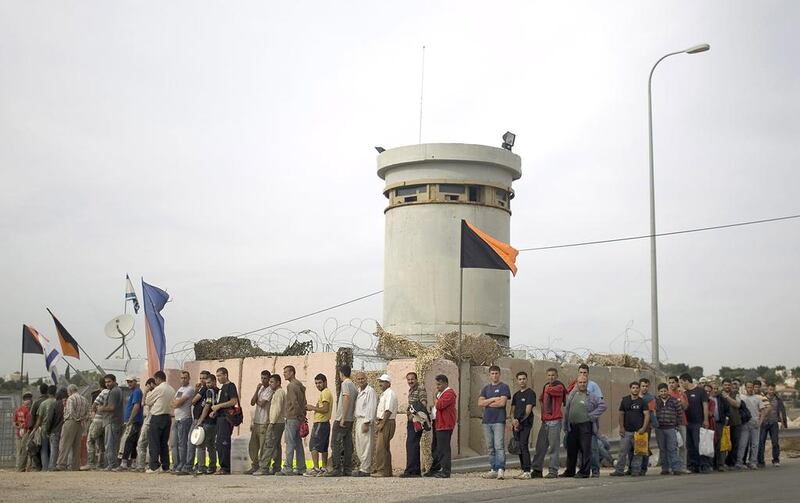This month marks 48 years since the start of Israel’s occupation of the Palestinian West Bank. What is remarkable about this sober anniversary is not the longevity of Israeli control over Palestinian life or the failure of various peace efforts, but that it took so long for a grass roots boycott movement to come into being that could apply serious pressure on Israel.
Such a boycott movement is now fully deployed on multiple fronts, from diplomatic initiatives to sport to pressure on international companies complicit in Israeli occupation.
Last week, Palestinians stopped just short of forcing a vote at Fifa's world congress on suspending Israel from international football. At the same time, years of pressure on French telecom giant Orange resulted in blistering remarks from its chief executive, Stephane Richard, stating he would pull his company out of Israel immediately if it were not for the legal quagmire that would ensue. On the diplomatic front, the European Union appears poised to start labelling Israeli goods produced in illegal settlements.
While Mr Richard quickly backtracked his statements and proclaimed that Orange will stay in Israel, the damage had been done and Israel’s leadership showed itself to be in utter disarray as to how to contain futhur boycotts. Israel’s hysterical reactions speak volumes about the direction the country is heading.
______________________________________________________________
Read more about the Israel boycott:
■ BDS is gaining support as all else has failed
■ Secret US meeting highlights Israel's panic over boycott
______________________________________________________________
At this stage, Israel is ironically playing directly into the hands of the boycott movement. In essence, the movement’s major selling point is continued Israeli arrogance, which underlines the boycotters’ mantra that only outside pressure can force Israel to stop its intransigence. Pending a radical announcement of an end to the occupation or even the serious curtailing of the settlement movement, both of which Israel is unable or unwilling to do, Tel Aviv seems helpless to defend itself against additional boycotts. After all, there is nothing unique to this boycott of colonial Israel. Boycotts are tried and true non-violent ways to force change on stubborn regimes the world over.
It is a testament to Israel’s hubris that it has allowed itself to be placed in such a position, seeing as it had intimate exposure to the boycotts of apartheid South Africa.
A couple of years ago, I interviewed an Afrikaner politician from the Democratic Alliance in his wood-panelled office in South Africa’s parliament in Cape Town. A former member of the National Party, which instituted and oversaw the apartheid government, the politician described how Israeli businessmen would visit South Africa in the 1980s to help white South African businessmen circumvent the international boycott by purchasing their products, smuggling them across the border to Zimbabwe, and then selling them on the open market with Israeli labels replacing the South African ones.
Stories like these demonstrate just how closely Israel watched the boycott bring down apartheid South Africa. Israeli strategists at various levels of government are familiar with the history of anti-colonial movements.
That Israel created a network of Palestinian collaborators and disrupts Palestinian political unity on every level is testament to this fact. And yet, despite this wealth of information and experience, Israel is reacting to its own boycott in the same hysterical way that apartheid South Africa did in the 1980s.
Last week, justice minister Ayelet Shaked forcefully argued that Israel should boycott the boycotts and "return fire". Other senior members of the Israeli leadership have dismissed the boycott as an "industry of lies" and labelled the movement anti-Semitic.
By equating boycotts with anti-Israel actions, Tel Aviv has sent a clear message to the world that its occupation and domination over Palestinian life are part and parcel of the country. Israelis don't even pay lip service to the idea that their occupation is a temporary measure that will end when a peace agreement comes into being and a two-state solution is realised.
Israel defends its behaviour in a manner that erases the Green Line that separates recognised Israel from Palestine and embraces the occupation as a permanent facet of Israeli statehood. In so doing, the Israeli leadership and the majority of Israelis essentially make the boycotters’ case for them.
A similar situation unfolded for the apartheid regime in South Africa when it was forced to its knees by boycotts. Apartheid leaders often argued that the regime was a necessary fact of life and even a right, in the same way that mainstream Israeli leaders speak about the occupation as their “right” to security and their “right” to build anywhere in the West Bank.
Regardless, Israel now stands naked in its colonial ambitions for the world to see. The most frightening part is that a majority of Israelis have come to embrace this position. History often repeats itself first as tragedy then as farce. We have entered the farcical episode of Israel's colonial history. It is unlikely that the country will enjoy the same sort of international support and protection now that its ambitions are clear and unavoidable.
jdana@thenational.ae
On Twitter: @ibnezra





